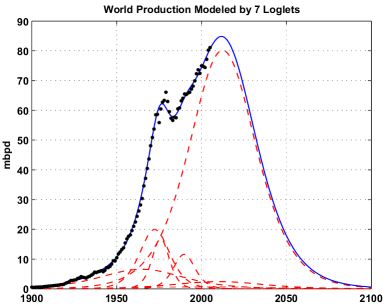It might not feel that long ago, but more than eight years have passed since Samuel Foucher published at TheOilDrum the Loglet analysis applied on petroleum. In the years that followed I used the results from this work intensively, regarding it as the most accurate model of fossil liquids extraction.
In reality, volumes extracted grew considerably slower than atecipated by this loglets model. Even if it captured accurately the dynamics of the petroleum system, the decline it portrayed was considerably delayed. After all this time, how have the results from the Loglets analysis evolved? Does it portrait a different scenario with further eight data points? This is what this work sets out to answer.
29 November 2014
22 November 2014
15 November 2014
Press review 15-11-2014 - Ravished Ukraine
Petroleum prices resumed the dive this week, with Brent closing below 80 $/b for the first time in four years. For now these are still small news on the backdrop of the world Economy, gripped with recession and spreading price deflation. The nervousness of governments is palpable in many countries.
Ukraine is back to the front pages with further escalation of the conflict. Combat intensified and the western media is reporting a large scale invasion of the Donbass by Russian forces. The mere risk a full out war poses on gas infrastructure is disturbing by itself.
There is still no gas flowing from Russia to Ukraine. The European Commission is having second thoughts and is for now refusing to foot the bill. A mild Autumn is supporting this policy, but on the wake of the Russia vilification campaign, leaving the Ukrainian nationalists out in the cold is not really an option.
Ukraine is back to the front pages with further escalation of the conflict. Combat intensified and the western media is reporting a large scale invasion of the Donbass by Russian forces. The mere risk a full out war poses on gas infrastructure is disturbing by itself.
There is still no gas flowing from Russia to Ukraine. The European Commission is having second thoughts and is for now refusing to foot the bill. A mild Autumn is supporting this policy, but on the wake of the Russia vilification campaign, leaving the Ukrainian nationalists out in the cold is not really an option.
08 November 2014
Press review 08-11-2014 - Brent is sinking
Commodities resumed the decline this week, pretty much all across the board. The economic outlook is grim, Governments appear week, with limited options, but are still keen on cutting ties with important partners such as Russia. This price rout is looking ever similar to what took place in 2008. For the energy sector in particular, these developments come at the worst of moments.
In a striking sign of times, the Brent petroleum field in the North Sea appears to be fast reaching the end of its economic life. The petroleum extracted from this field has been the benchmarks for about half of all the petroleum traded internationally. Ironically, the benchmark seems no longer able to support itself. Soon the media might have to start referring to a different international price index.
In a striking sign of times, the Brent petroleum field in the North Sea appears to be fast reaching the end of its economic life. The petroleum extracted from this field has been the benchmarks for about half of all the petroleum traded internationally. Ironically, the benchmark seems no longer able to support itself. Soon the media might have to start referring to a different international price index.
01 November 2014
Press review 01-11-2014 - Nationalism is great in Summer
This was a busy a week, with many points of interest emerging throughout. Commodities in general kept falling in price against the US$, but the Brent index remained essentially flat.
Sunday, two thirds of Ukraine elected a new Parliament, guaranteeing the permanence of nationalist forces in power. The russophone separatist regions of Luhansk and Donetsk should held their own elections in short order, in spite of having one million refugees in Russia.
The gas supply pre-agreement drafted last week was finally confirmed. Russia dragged negotiations trying to force the EU into a parallel agreement guaranteeing payment on behalf of Ukraine. Such formality did not come to fruition, but it is clear it will be European tax payers largely paying for the gas consumed by Ukraine for the foreseeable future.
Sunday, two thirds of Ukraine elected a new Parliament, guaranteeing the permanence of nationalist forces in power. The russophone separatist regions of Luhansk and Donetsk should held their own elections in short order, in spite of having one million refugees in Russia.
The gas supply pre-agreement drafted last week was finally confirmed. Russia dragged negotiations trying to force the EU into a parallel agreement guaranteeing payment on behalf of Ukraine. Such formality did not come to fruition, but it is clear it will be European tax payers largely paying for the gas consumed by Ukraine for the foreseeable future.

